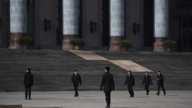【新唐人2013年01月31日訊】近期,中共中央政治局進行了第三次集體學習。中共中央總書記習近平在會議上強調,中國人民怕的就是動盪,求的是穩定,任何外國不要指望中共會拿自己的核心利益做交易。國際媒體認為,習近平發出了比前任胡錦濤更加「刺耳的聲音」。而分析人士指出,習近平的一番話是「醉翁之意不在酒」。下面請看本臺記者的報導。
中共喉舌《新華社》消息,1月28號下午,在政治局第三次集體學習時,習近平強調,要堅持走和平發展道路,但決不能放棄正當權益,決不能犧牲核心利益。任何外國不要指望中共會拿自己的核心利益做交易,不要指望他們會吞下損害中國主權、安全、發展利益的苦果。
英國《金融時報》報導說,習近平似乎在暗示,將在國際舞臺上持更強硬的姿態。報導強調,如果習近平有意推行更強硬的外交政策,那麼,很多國家將感到擔憂,包括早已和北京在東海和南海領土上有爭議的國家,比如日本、越南和菲律賓。
而香港《動向》雜誌報導,年初,中共副軍級以上軍官都暫停休假,各軍兵種將展開新層次實戰戰鬥演習。雜誌還披露,中央政治局已制定了對釣魚島及沿海島嶼的戰略方針和政策,將在五年或更短時間內解決釣魚島問題。
時事評論員林子旭表示,目前釣魚島以及南海領土爭端問題,讓中國和周邊國家的關係變得有些緊張。林子旭認為,習近平的這番話,應該是在向國際社會闡明他的立場。
時事評論員林子旭:「但是,我想習近平是醉翁之意不在酒,他有可能是想要藉助這番強硬的講話,進一步樹立自己在黨內,在軍隊中的權威,用這種方法來消除一些噪音,進一步鞏固自己的絕對權力。」
林子旭認為,習近平更希望把這番話傳遞到中國老百姓的耳朵裡,讓老百姓感覺到習近平對內懲治腐敗,對外維護主權的從政作風。
林子旭:「不過,我認為習近平的講話,雖然相對強硬,但是,落到實處的時候,他也很難有甚麼更大的作為。目前中共這個體制已經是千瘡百孔,經不起半點的折騰,習近平坐在這個腐爛的體制上到甚麼時候﹖他首先要考慮的是中共體制的存亡,這就會讓他說的很多話,在具體實施的時候,就要被大打折扣。」
「中國民主黨美國委員會」秘書處副秘書長陶宏波表示,中共很多做法的最終目地,是為了維護共產黨的獨裁統治。在釣魚島的問題上,中共把中國老百姓,綁架在共產黨的利益之上。企圖挑起老百姓的民族情感、和一致對外的情緒。
中國民主黨美國委員會秘書處副秘書長陶宏波:「釣魚島事件不是今天才發生的,其實已經存在了幾十年的問題了,為甚麼到現在把這個事情搞得這麼大,目地還是因為共產黨的統治地位,已經岌岌可危、搖搖慾墜。」
29號,習近平以中共中央軍委主席的身份到武警部隊視察。《新華社》報導,習近平要求武警保持如「如箭在弦,隨時待發」。並且,要深刻認識當前維穩形勢的複雜性,確保部隊「召之即來、來之能戰、戰之必勝」。
林子旭:「這說明中共目前這個統治已經陷入極度的危機當中了,中共需要用一個部隊的力量,來鎮壓人們對民主、自由的追求。他講戰之必勝,那是要戰勝誰呢?難道是要戰勝手無寸鐵的老百姓嗎?」
習近平訪問武警部隊時還談到,要確保部隊絕對忠誠、絕對純潔、絕對可靠。外界分析,習近平透露了中國大陸的內亂隱憂,以及他的擔心。同時,折射出中共政局內鬥的嚴重程度。
採訪編輯/常春 後製/王明宇
What is the Hidden Meaning behind Xi Jinping’s Remarks?
The Political Bureau of the Chinese regime
had their third group study recently.
Xi Jinping, the general secretary of the Chinese Communist
Party (CCP), presided over the study and stressed that the
Chinese people are afraid of turmoil “and demand stability.
Foreign countries that expect China to surrender
its core interests will be disappointed."
The international media think that Xi Jinping sent out
a “shriller voice" than his predecessor, Hu Jintao.
Analysts point out that Xi’s remarks carry a hidden meaning.
Let’s look at the report.
The CCP mouthpiece Xinhua News Agency reported,
“On the afternoon of January 28,
during the third group study for the Political Bureau,
Xi Jinping stressed the need to adhere to the path of peaceful development,
but must neither give up legitimate rights
nor sacrifice core interests.
No foreign country should expect China
to give up its own core interests or
expect China to bear the harm of losing her sovereignty,
security and development interests.
The British “Financial Times" reported Xi Jinping
seemed to imply that he would hold a tougher stance on the international stage.
The report stressed that Xi Jinping’s intention to implement
a tougher foreign policy caused concerns for many countries.
Particularly, countries that have had territorial disputes
with China in the East China Sea and the South China Sea,
such as Japan, Vietnam and the Philippines.
Hong Kong “Trends" magazine reported at the beginning of
2013, the CCP deputy army level officers were all on leave,
and all branches of the military launched a
new level of combat exercises.
The magazine also revealed that the Central Committee
has formulated strategic principles and policies regarding Diaoyu Islands and the coastal islands.
The CCP intends to resolve the Diaoyu Islands
issue within five years.
Political commentator Lin Zixu said the Diaoyu Islands
as well as territorial disputes in the South China Sea
have intensified the relationships between China
and neighboring countries.
Xi Jinping’s remarks have clarified his position
to the international community.
Political commentator Lin Zixu:
“But, I think there is a hidden purpose.
He may want to use a tough speech to further
establish his authority in the party and military.
In addition, it can also eliminate some of the unwanted
noise and further consolidate his absolute power."
Lin Zixu believes that Xi Jinping would like
the Chinese people to hear his words,
so people would know Xi Jinping is fighting corruption
internally and maintaining sovereignty externally.
Lin Zixu: “However, I think that President Xi Jinping’s
speech was relatively tough, but when implementing it,
it is difficult to have any great impact.
Because the CCP has been riddled with too many
problems to take any more crises and consequently,
Xi Jinping is sitting on this rotten system,
his first job is to keep the CCP alive.
Therefore, the effects of anything he says or
does will be greatly reduced when being implemented."
Tao Hongbo, deputy secretary of Democratic Party in the US,
said that the CCP’s ultimate purpose behind many
of its practices is to maintain its dictatorship.
The CCP has tied up the Chinese people with
its interests regarding the Diaoyu Islands issue.
The CCP attempt to stir up Chinese nationalism
and sentiments.
Tao Hongbo: “the Diaoyu Island incident did not happen
today. In fact, it has existed for decades.
But, why has it turned into something so serious.
Mainly it is because the CCP is about to collapse."
On 29th January, Xi Jinping inspected the
armed police force, reported “Xinhua News Agency."
Xi Jinping asked the armed police to be ready
for combat in a moment’s notice.
The armed police should understand the complexity
of the current situation and be ready not only to fight but also to win the war.
Lin Zixu: “This shows that the CCP is facing a crisis
and needs the armed forces to suppress people’s pursuit of democracy and freedom.
To win a war against whom? Do they want to win a war
against the unarmed Chinese people?"
When Xi Jinping visited the armed police force,
he asked the troops be absolutely loyal, absolutely pure, and absolutely reliable.
Observers think that Xi Jinping revealed his worries
over Mainland China’s civil strife.
At the same time, it also reflects the severity
of the infighting within the CCP.



























